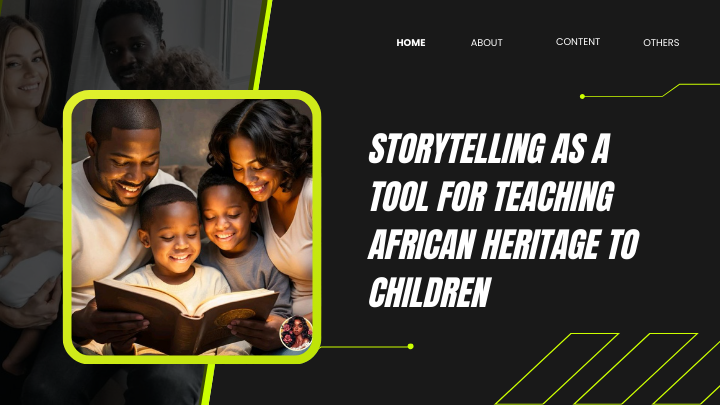Storytelling: Teaching African Heritage to Kids
Storytelling is one of the oldest and most powerful methods of transmitting knowledge, culture, and values. For centuries, African societies have used stories—folktales, myths, and legends—to preserve their history, teach important life lessons, and pass down cultural wisdom from one generation to the next. In African cultures, storytelling is an integral part of everyday life, deeply woven into family traditions, social gatherings, and community events.
For children growing up in multicultural environments, storytelling provides an essential tool for connecting to their African heritage. These stories not only teach moral lessons but also foster a strong sense of identity, pride, and community. By incorporating African folktales and legends into family life, parents can instill in their children a deep appreciation for their roots and the values that have shaped their cultures for generations.
1. The Power of African Folktales
African folktales are rich in symbolism, imagination, and creativity. These stories often feature animals, gods, and legendary heroes who embark on thrilling adventures or face moral dilemmas. Through these characters and their actions, children learn about the values that are integral to African life, such as respect, humility, courage, wisdom, and community.
How to Use African Folktales:
- Introduce Folktales as Family Traditions: Set aside time each week to share a folktale with your children. Create a cozy, engaging atmosphere, perhaps with dimmed lights or sitting by a campfire (or even a fireplace), to replicate the traditional storytelling setting. This helps to make storytelling a meaningful ritual in the family.
- Choose Stories with Relevant Lessons: Many African folktales contain life lessons that are relevant today. For example, the story of Anansi the Spider (a popular West African character) teaches the value of cleverness and the consequences of greed. These lessons can be used to address challenges children face in their everyday lives.
- Engage Their Imagination: African folktales are often filled with vibrant imagery and fantastical characters. Use storytelling as an opportunity to encourage your children's creativity and imagination. Encourage them to retell the stories in their own words, using their own unique spin, or even act out the characters.
Why It’s Important: African folktales not only preserve cultural history, but they also teach children about their roots, the customs of their ancestors, and the lessons that have guided generations. Through these stories, children can understand the values of their culture and incorporate them into their own lives.
2. Myths and Legends: Connecting to African Spirituality
Myths and legends form another crucial part of African storytelling traditions. These stories often delve into the origins of the world, the gods and deities that shape human existence, and the relationship between the natural world and the divine. Myths play a central role in explaining natural phenomena, establishing moral codes, and connecting individuals to their ancestors and the spirits.
How to Use Myths and Legends:
- Explore Creation Myths: Many African cultures have creation myths that explain how the world came into being and the role of gods and spirits in shaping human life. Sharing these stories can provide a rich, spiritual connection to the past. For example, the Yoruba creation myth tells the story of the god Obatala, who shaped humans from clay. Teaching children about these myths helps them understand African cosmology and the spiritual beliefs of their ancestors.
- Incorporate Storytelling in Spiritual Practices: Many African cultures believe that stories connect individuals to their ancestors and the divine. By incorporating myths into family rituals, you can deepen your children's understanding of the spiritual and religious aspects of African heritage. For example, lighting candles or offering prayers while sharing a story of ancestral wisdom can provide a meaningful experience.
- Use Legends to Teach Values: Legends often feature heroes who embody virtues such as bravery, wisdom, or self-sacrifice. Sharing stories of legendary figures, like Shaka Zulu or the epic tale of Sundiata Keita, can inspire children and teach them about the values of leadership, resilience, and honor.
Why It’s Important: Myths and legends serve as a bridge between the physical and spiritual worlds, helping children understand their place in the universe and the connection between their culture and the divine. By sharing these stories, parents can help children develop a deeper sense of spirituality and an understanding of African belief systems.
3. African Proverbs: Wisdom in a Few Words
Proverbs are a concise and powerful form of storytelling that captures the wisdom of African cultures. These short, memorable sayings often reflect universal truths and are used to guide behavior, offer advice, and reinforce values. Proverbs are often used in everyday conversations to teach children important life lessons in a way that is easy to remember and understand.
How to Use Proverbs:
- Teach Proverbs as Daily Lessons: Incorporate African proverbs into your daily conversations with your children. For example, the Nigerian proverb "Wisdom is like a baobab tree; no one individual can embrace it" can be used to teach the importance of humility and learning from others.
- Reflect on the Meanings: After sharing a proverb, take time to discuss its meaning and how it applies to your child’s life. For instance, the Ghanaian proverb "If you want to go fast, go alone; if you want to go far, go together" can be used to emphasize the value of teamwork and cooperation.
- Encourage Children to Share Their Own Proverbs: Encourage your children to create their own proverbs or reflect on the lessons they've learned from stories. This not only enhances their understanding of African wisdom but also fosters creativity and self-expression.
Why It’s Important: Proverbs are an accessible and effective way to pass down the knowledge and values of African cultures. They teach children how to navigate the complexities of life by offering guidance that is both practical and profound. Proverbs also highlight the importance of community, respect, and self-awareness.
4. The Role of Storytelling in Building Cultural Pride
African storytelling is not just about teaching specific lessons or passing down knowledge—it is also about building a sense of cultural pride and identity. By introducing children to African folktales, myths, legends, and proverbs, parents can instill in them a deep sense of pride in their African heritage. This cultural connection serves as a foundation for self-esteem, belonging, and resilience in the face of challenges.
How to Build Cultural Pride Through Storytelling:
- Highlight African Achievements: Many African stories highlight the accomplishments of great leaders, artists, and visionaries. Share stories of influential African figures like Nelson Mandela, Chinua Achebe, and Haile Selassie to inspire your children and teach them about the achievements of their ancestors.
- Connect Stories to Contemporary Life: Relate the themes of African stories to modern-day challenges. For example, you could discuss the importance of resilience in the face of adversity by using stories of African heroes who overcame struggles, showing your children how they can apply these lessons in their own lives.
- Involve Extended Family in Storytelling: Storytelling is a communal activity that fosters connection between generations. Involve grandparents, uncles, aunts, and other family members in sharing stories with the children. This not only creates a sense of community but also reinforces the continuity of African traditions.
Why It’s Important: Storytelling is an effective way to pass down cultural heritage and cultivate a deep sense of pride and belonging. By immersing children in African stories, they develop a strong, positive identity that helps them navigate the complexities of the modern world while staying grounded in their cultural roots.
5. Storytelling as a Tool for Social and Emotional Learning
In addition to teaching cultural knowledge, African storytelling plays a crucial role in emotional and social development. Many folktales and myths are designed to teach children how to navigate relationships, handle emotions, and make ethical decisions. Through these stories, children learn empathy, compassion, and problem-solving skills.
How to Use Storytelling for Emotional Learning:
- Discuss Characters’ Emotions: Explore the emotions of the characters in the stories. For example, in the story of the tortoise and the hare, children can learn about humility and the importance of not underestimating others. Ask your children how they would feel if they were in the characters’ shoes, helping them develop empathy.
- Teach Conflict Resolution: Many African folktales focus on resolving conflicts through wisdom, patience, and cooperation. These stories can be used to teach children how to handle disagreements and find peaceful solutions.
- Encourage Self-Reflection: After sharing a story, ask your children what they learned and how they can apply the lessons to their own lives. This promotes self-awareness and helps children make thoughtful decisions.
Why It’s Important: Storytelling offers a rich opportunity for children to explore emotions and develop social skills. The lessons learned from these stories can positively shape their character and decision-making abilities, helping them grow into compassionate, well-rounded individuals.
Storytelling is an invaluable tool for teaching African heritage to children. Through folktales, myths, legends, and proverbs, children are introduced to the rich history, values, and traditions of Africa. These stories not only pass down cultural knowledge but also inspire creativity, resilience, empathy, and pride. By incorporating storytelling into everyday life, parents can create an environment where children can connect with their roots, learn important life lessons, and develop a strong sense of identity that will guide them throughout their lives.



